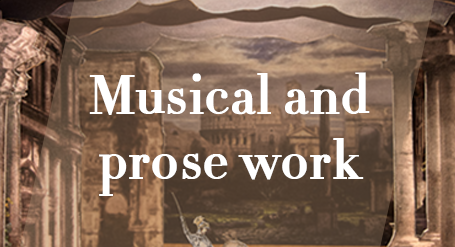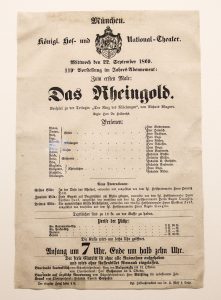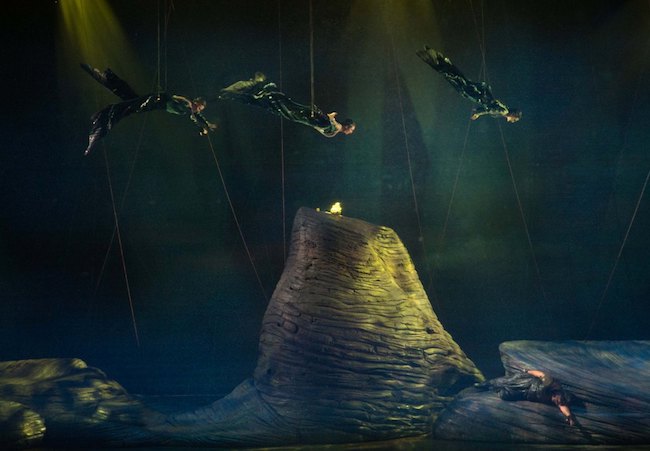
The musical work of Richard Wagner is composed of operas or “musical dramas” ranging from “Fairies” (Die Feen) to “Parsifal”. A detailed presentation of each of these major works is associated here with a set of thematic articles, placing them not only in the context of his personal life but also in his social, economic and cultural context. This section also includes all the musical works (excluding opera) and his literary work.
The Rhinegold, WWV86A
Das Rheingold, WWV86A
First of the four dramas
from Richard Wagner’s cycle Der Ring des Nibelungen
Premiere:
22 September 1869, Munich (Royal Court and National Theatre),
led by Franz Wüllner
Premiere at Bayreuth :
13 August 1876 ( Bayreuther Festspielhaus), led by Hans Richter
Cast:
The Gods
WOTAN, God of battle, and of contracts, ruler of the gods (bass-baritone)
LOGE, Demi-god of fire, Wotan’s clever, manipulative executive servant (tenor)
FRICKA, Goddess of family values; wife to Wotan (mezzo-soprano)
FREIA, Goddess of love and beauty, guardian of the golden apples (soprano)
FROH, God of spring and sunshine; Freia’s gentle brother (tenor)
DONNER, God of thunder; Freia’s hot-tempered brother (baritone)
ERDA, Primal earth mother, goddess of earthly wisdom (contralto)
The Giants
FASOLT, Giant, in love with Freia (bass)
FAFNER, Giant; Fasolt’s ruthless brother (bass)
The Nibelungs
ALBERICH, Power-hungry dwarf, lord of the Nibelungs (baritone)
MIME, Alberich’s brother, a cowardly expert metal-smith and Siegfried’s foster father (tenor)
The Rhinemaidens
WOGLINDE (soprano)
WELLGUNDE (soprano)
FLOSSHILDE (contralto)
Duration: 2hrs.30
![]()
 The Rhinegold (Das Rheingold), WWV 86A, is the first of the four music dramas that constitute Richard Wagner’s Der Ring des Nibelungen, (The Ring of the Nibelung). It was performed, as a single opera, at the National Theatre Munich on 22 September 1869, and received its first performance as part of the Ring cycle at the Bayreuth Festspielhaus, on 13 August 1876.
The Rhinegold (Das Rheingold), WWV 86A, is the first of the four music dramas that constitute Richard Wagner’s Der Ring des Nibelungen, (The Ring of the Nibelung). It was performed, as a single opera, at the National Theatre Munich on 22 September 1869, and received its first performance as part of the Ring cycle at the Bayreuth Festspielhaus, on 13 August 1876.
Wagner wrote the Ring librettos in reverse order, so that Das Rheingold was the last of the texts to be written; it was, however, the first to be set to music. The score was completed in 1854, but Wagner was unwilling to sanction its performance until the whole cycle was complete; he worked intermittently on this music until 1874. The Munich premiere of Das Rheingold was staged, much against Wagner’s wishes, on the orders of his patron, King Ludwig II of Bavaria. Following its 1876 Bayreuth premiere, the Ring cycle was introduced into the worldwide repertory, with performances in all the main opera houses, in which it has remained a regular and popular fixture.
In his 1851 essay Opera and Drama, Wagner had set out new principles as to how music dramas should be constructed, under which the conventional forms of opera (arias, ensembles, choruses) were rejected. Rather than providing word-settings, the music would interpret the text emotionally, reflecting the feelings and moods behind the work, by using a system of recurring leitmotifs to represent people, ideas and situations. Das Rheingold was Wagner’s first work that adopted these principles, and his most rigid adherence to them, despite a few deviations – the Rhinemaidens frequently sing in ensemble.
As the “preliminary evening” within the cycle, Das Rheingold gives the background to the events that drive the main dramas of the cycle. It recounts Alberich’s theft of the Rhine gold after his renunciation of love; his fashioning of the all-powerful ring from the gold and his enslavement of the Nibelungs; Wotan’s seizure of the gold and the ring, to pay his debt to the giants who have built his fortress Valhalla; Alberich’s curse on the ring and its possessors; Erda’s warning to Wotan to forsake the ring; the early manifestation of the curse’s power after Wotan yields the ring to the giants; and the gods’ uneasy entry into Valhalla, under the shadow of their impending doom. (read more…)
If you wish to share further information about this article, please feel free to contact us !
